#don vittorio
Text
Don't even ask me what's going on in this panel-

#If I would guess the artists left this up for self-interpretation???#Cuz we got the usual depressive Krusty and seeing by the tickets#he's definitely down in the dumps again#Then meanwhile on the bleachers#we got Louie and Legs being anxious boys while Tony and Vittorio are cheering? I would say#Maybe Krusty put up a deal with the mafia and now he has lost that deal#with how he betted on the wrong dogs over and over#and also Larry Burns and Joey “The Scar” are there-#Springfield Mafia#Louie#Legs#Fat tony#Krusty the clown#Larry Burns#The Simpsons Guide to Springfield#Don Vittorio#Joey “The Scar”
36 notes
·
View notes
Photo








https://simpsonswiki.com/wiki/Don_Vittorio_DiMaggio
12 notes
·
View notes
Text
Ebrei e cattolici, tre esempi di grande umanità
Donna Gracia Mendes Nassì, Emanuel Merdinger e Vittorio Cini: dal XVI secolo al Novecento, avventure e aneddoti per capire l’importanza delle libertà religiosa e culturale
A cura di Andrea Musacci
Una trama complessa di relazioni, sempre illuminate dal desiderio di libertà e verità. Sono le storie raccontate il 25 gennaio, in occasione del Giorno della Memoria, a Palazzo Roverella a Ferrara.…
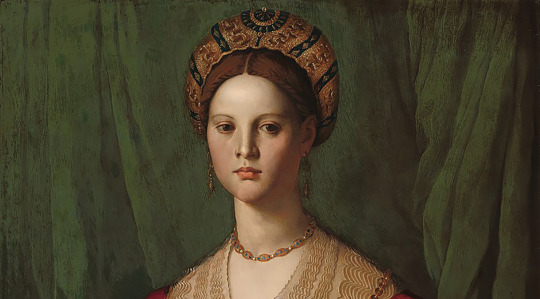
View On WordPress
#Carlo Magri#Don Claudio Vanetti#Donna Gracia Mendes Nassì#Emanuel Merdinger#Ferrara#Francesco Paparella#Francesco Scafuri#Giorno della Memoria#Giovanni Alliata Cini#Marialucia Menegatti#Palazzo Roverella#Riccardo Modestino#Vittorio Cini
1 note
·
View note
Text
Vittorio Arrigoni detto Vik è stato un attivista, giornalista e scrittore italiano. Sostenitore della soluzione binazionale come strumento di risoluzione del conflitto israeliano-palestinese, nonché pacifista, si era trasferito nella Striscia di Gaza per agire contro quella che definiva pulizia etnica dello Stato di Israele nei confronti della popolazione araba palestinese.
Sembra oggi ma parliamo di 25 anni fà
Una lettera di Vittorio del 02 marzo 2009 due anni dopo fu assassinato.
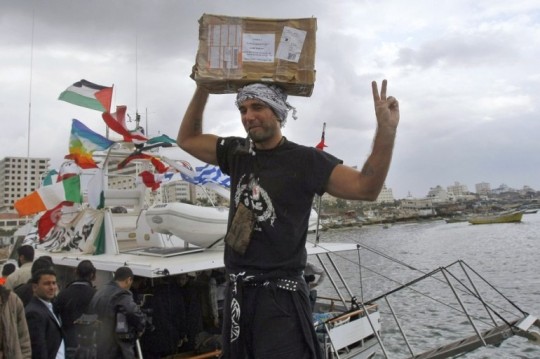
Vittorio tornato a Gaza
«E alla fine sono tornato.
Non sazio del silenzio d’assenzio di una felicità incolta
accollata come un cerotto mal riposto su di una bocca che urla.
Non potevo fare altrimenti.
Essere ferito, venir rapito, derubato della propria missione, incatenato e imprigionato in un lurido carcere israeliano,
quindi deportato a forza su di un aereo verso Milano
senza neanche la pietà di mettere ai miei piedi nudi e martoriati dalle catene un paio di scarpe,
non è certo la conclusione auspicabile per il compito solenne e di riscatto umano che ha impegnato gli ultimi mesi della mia barocca vita.
Il leone accumula stagioni e cicatrici,
non ha certo il passo slanciato di una volta,
ma non abbassa di un pelo la criniera.
Poggiando il primo piede sulla terra di Gaza, per la seconda volta, sbarcando, come un Armstrong esiliato,
ho ruggito, eccome,
devono esser tremati i vetri delle finestre pure a Tel Aviv.
Fiero del mio passato, non curante del mio presente.
Perché è questo il tempo di spendersi, piuttosto che accaparrarsi un futuro agiato e comodamente distorto,
a quelle vittime innocenti a cui non abbiamo concesso neanche l’ascolto, per un attimo,
delle loro grida di dolore.
Spendersi affinché ogni diritto umano sia rispettato.
Tutto il resto non ha più importanza, semmai ne abbia mai avuta una.
Bisogna saper riconoscere la matrice della propria anima,
anche se ciò è spaventevole e significa solitudine, ostracismo, utopia, Don Chisciotte,
ingratitudine anche da chi verso cui si è dato tanto, si è speso tutto.
Ad aspettare nel fuoco si rischia di bruciarsi.
Ecco allora il perché della scelta dei miserabili, dei reietti, dei condannati,
essi sono ancora capaci di lealtà, di gesta aggraziate e di generosità audace, alle soglie della fine del mondo.
Reietto e miserabile la vita mi ci ha costretto,
sono tornato a casa.
Natale a Gaza pare un funerale.
E non esclusivamente perchè oggi ad un funerale effettivamente ci sono stato,
il vicino di casa di Fida, nostra coordinatrice ISM,
è stato ridotto in brandelli, in tanti piccoli pezzettini di carne lacera da un colpo di carroarmato israeliano.
Piove lacrime amare il cielo di Gaza in questi giorni di lutto e terrorismo da oltreconfine.
Si ascoltano i rutti delle minacce di imminente strage da Lvni e si trema dal freddo
(senza + gas, senza + gasolio, senza + energia elettrica).
Si odono i cingoli di Netanyahu sulle ossa dei palestinesi ammazzati ieri e di quelli a venire.
Lvni e Netanyahu in marcia funebre verso le prossime elezioni israeliane,
il teorema è semplicistico, ma purtroppo realistico,
vincerà chi porterà in dote ai propri elettori più teste palestinesi mozzate.
One head one vote.
A Gaza è come se si fosse in autunno,
e io sono nato sotto il segno dell’autunno.
Per cui se fuori piove,
perdonatemi,
a volte piove anche dentro.
Restiamo umani.
Vostro Vik dalle tenebre dell’assedio.»
24 notes
·
View notes
Text
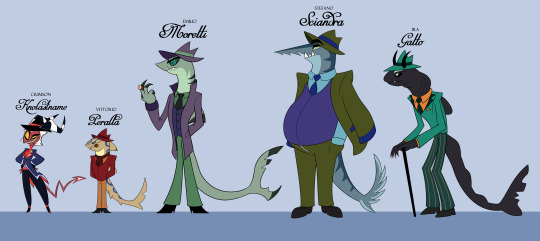


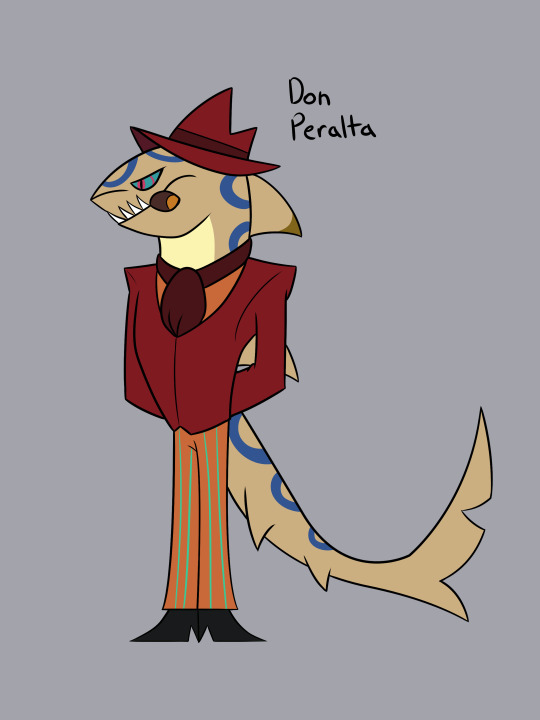
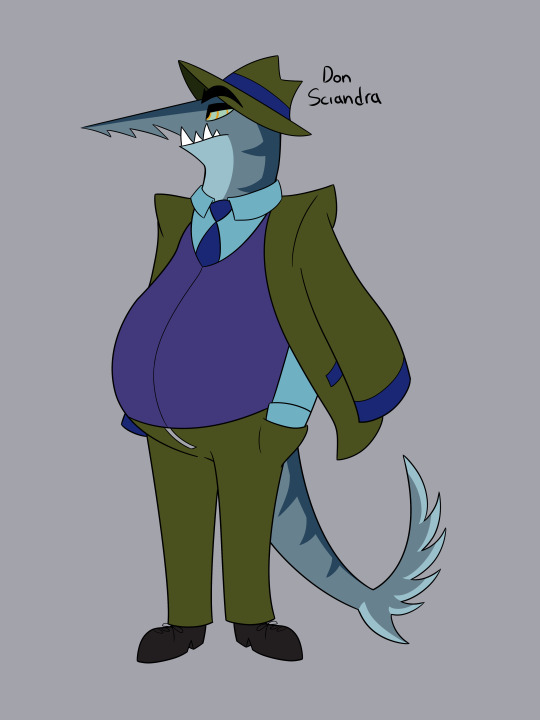
The Notamafia Commission
There are Five Families in Notamafia, each controlling their own neighborhood
Midtown Notamafia has the biggest hotels, the racing track, swankiest nightclubs, and the most valuable rackets in town. One Family controls it - The Morettis, tough sons of bitches. Don Emilio Moretti is an honorable man, but if you cross him once, you're a dead man.
Then, there's the Peraltas, from Cocthills. Whatever you do, don't bring up Don Vittorio Peralta's height. As for Cocthills – it's pretty ritzi, but watch out near the waterfront. If you had a dime for every cheap hotel, brothel or sleazy clipjoint, you'd be a very wealthy man.
Look into the face of a Sciandra, and you'll see one thing - trouble. You don't wanna run into them on a dark night in their Downtown Heights stronghold. At first the place looks pretty quiet, all little shops and fancy parks - but watch out. Never pay the Sciandras a visit if you're ill prepared. There's rumours about Don Estefano Sciandra having... cannibalistic tastes.
Lower Notamafia is one of the city's toughest neighborhoods, controlled by the Gattos. They ain't that rich - a few gambling clubs and brothels, plus some weapons. Lower Notamafia is a sewer, full of burned-down tenements and empty warehousees. The railyards are a rats' nest of scumbags and late night wheeling and dealing. Don't underestimate Don Ira Gatto, though. He might look old and frail, but there's a reason why he's still in charge.
Finally, there's the Knolastnames - the only family led by Imp Dons from their humble beginnings in the Docks. Until recently, they had some financial troubles, which the other Families attribute to its... poor management. There's rumors that the consigliere, Alessio, is the one truly in charge. The Commision would certainly prefer him in that role rather than Don Crimson.
Notamafia Town has many criminal gangs and organizations, but these five are the big fish—literally in four cases.
13 notes
·
View notes
Text

Miami Vice
The clothes worn on Miami Vice had a significant influence on men's fashion and popularized Italian men's fashion in the United States.
In every episode, Crockett and Tubbs wore 5 to 8 outfits appearing in shades of pink, blue, green, peach and fuchsia. Designers such as Vittorio Ricci, Gianni Versace, and Hugo Boss were consulted in keeping the male leads looking trendy.
Don Johnson's typical attire of Italian sport coat, T-shirt, white linen pants, sockless loafers and Ray Ban of Model L2052 or Ray-Ban Wayfarers. In the first season he wore an 18k Rolex Day-Date "President" model, than Ebel won the contract for the remaining seasons.
Funko Pop TV Miami Vice Crockett and Tubbs
My Funko Pop collection here
#Funko Pop TV#Funko Pop#Funko#Figures#figure#toy#toys#Miami#Miami Vice#Tv#tv series#Don Johnson#Philip Michael Thomas#Ricardo Tubbs#Tubbs#Sonny Crockett#Crockett#Funko Pop TV Miami Vice Crockett and Tubbs#'80s#Fashion#Italian men's fashion#men's fashion#men's style#men's wear#menswear#men's clothing#Gianni Versace#Versace#Hugo Boss#Ray Ban
15 notes
·
View notes
Text
The Top 40 Most Popular Operas, Part 4 (#31 through #40)
A quick guide for newcomers to the genre, with links to online video recordings of complete performances, with English subtitles whenever possible.
Donizetti's Don Pasquale
Another comedy of manners with a melodic bel canto score.
Teatro Lirico di Cagliari, 2003 (Alessandro Corbelli, Eva Mei, Antonino Siragusa, Roberto de Candia; conducted by Gérard Korsrten)
Verdi's Macbeth
The first of Verdi's great Shakespearean operas.
Zürich Opera, 2001 (Thomas Hampson, Paoletta Marrocu, Roberto Scandiuzzi, Luis Lima; conducted by Franz Welser-Möst)
Beethoven's Fidelio
Beethoven's only opera, a drama of love, courage, and idealism in the face of political corruption.
Vienna State Opera, 1979 (Gundula Janowitz, René Kollo, Hans Sotin, Manfred Jungwirth, Lucia Popp; conducted by Leonard Bernstein)
Gounod's Faust
One of the most wildly popular operas in the 19th and early 20th centuries: a melodic French interpretation of the Faust legend.
Vienna State Opera, 1985 (Francisco Araiza, Gabriela Benacková, Ruggero Raimondi; conducted by Erich Binder)
Richard Strauss's Salome
Strauss's one-act operatic translation Oscar Wilde's erotic and powerful Biblically-inspired play.
Teatro Comunale di Bologna, 2010 (Erika Sunnegårdh, Mark S. Doss, Robert Brubaker, Dalia Schaechter, Mark Milhofer; conducted by Nicola Luisotti)
Puccini's Gianni Schicchi
Puccini's only comic opera, a rollicking one-act farce inspired by a passage from Dante's Divine Comedy.
Teatro alla Scala, 2008 (Leo Nucci, Nino Machiadze, Vittorio Grigolo, Cinzia De Mola; conducted by Riccardo Chailly)
Verdi's Don Carlo
A grand, tragic historical drama of politics, love vs. duty, intergenerational conflict, friendship (of the vaguely homoerotic variety), and abuse of power.
Metropolitan Opera, 1983 (Plácido Domingo, Mirella Freni, Nicolai Ghiaurov, Louis Quilico, Grace Bumbry, Ferruccio Furlanetto; conducted by James Levine)
Bellini's Norma
A great bel canto soprano vehicle, depicting a tragic love triangle amid the Roman conquest of Gaul.
Sydney Opera House, 1978 (Joan Sutherland, Margareta Elkins, Ron Stevens, Clifford Grant; conducted by Richard Bonynge)
Richard Strauss's Ariadne auf Naxos
A unique "opera within an opera" that explores the themes of comedy vs. drama and "low art" vs. "high art."
Salzburg Festival, 1965 (Hildegard Hillebrecht, Sena Jurinac, Reri Grist, Jess Thomas; conducted by Karl Böhm)
Gluck's Orfeo ed Euridice (Orpheus and Eurydice)
A groundbreaking early Classical interpretation of the Orpheus myth, replacing the pageantry of Baroque opera with "noble simplicity."
Feature film, 2014 (Bejun Mehta, Eva Liebau, Regula Mühlemann; conducted by Vaclav Luks) (no subtitles; read the libretto in English translation here)
#opera#top 40#31 through 40#video#complete performances#english subtitles#don pasquale#macbeth#fidelio#faust#salome#gianni schicchi#don carlo#norma#ariadne auf naxos#orfeo ed euridice
16 notes
·
View notes
Text
wip tag game
Rules: Reveal the titles of the documents in your WIP folder and tag as many people as there are documents. Let others ask questions about the ones that interest them and post snippets or explain the contents as you see fit!
tagged by @hellcheer-heaven & @a-strange-inkling Sorry I never saw this!
Kinktober Hellcheer Glory Hole Oneshot
Hear Cute (11/18 I think. Love is Blind Hellcheer AU.)
Vampire Chrissy Outline (Oneshot for Halloween Event)
Poprocks (2/? The Taylor Swift fake dating Hellcheer AU)
Rules as Written (5/12ish? Thumbelina Hellcheer AU)
87' Honey (6/?? the Canon Divergence Hellcheer AU)
Easter Sunday (5/????? Gotham Memoirs prostitute AU)
Death's Pal and his Gal (?????? Nino Ricci backstory)
Incognito Mode (2/??? Only Fans Time Princess Vittorio thing)
Don of the Dead (??? Necromancer Puzo fic...)
Lilac and Lush (26/30 Lotor x Allura fic)
The House that Skywalker Built (10/18 Reylux modern BDSM)
Message Sent (29/33 Solavellan Modern Texting)
Diplomatic Gestures (25/35 Jessamine x Corvo backstory)
There's a lot more than that but these are the ones that aren't dead. Sorry to all my Overwatch fics and my other Star Wars AUs. Tagging @virusq @therentyoupay @sharpenote @bettsfic
13 notes
·
View notes
Text
i like when in the sopranos they go to italy and the big boss of the family is an old disabled guy and all he wants to do is talk about roads and bridges. rip don vittorio you would have loved wikipedia and websites run by some autistic guy who took photos of every single highway sign in new jersey
5 notes
·
View notes
Text

No 'cuz like once I saw them in the first episode of season 34 I immediately knew it was gonna get good and now we have gotten the treat that is "The Many saints of springfield" with those adorable goofballs.
#I fucking knew it#Springfield Mafia#Louie#Legs#Fat tony#Johnny tightlips#Frankie the squealer#Don vittorio#Luigi Risotto
26 notes
·
View notes
Text
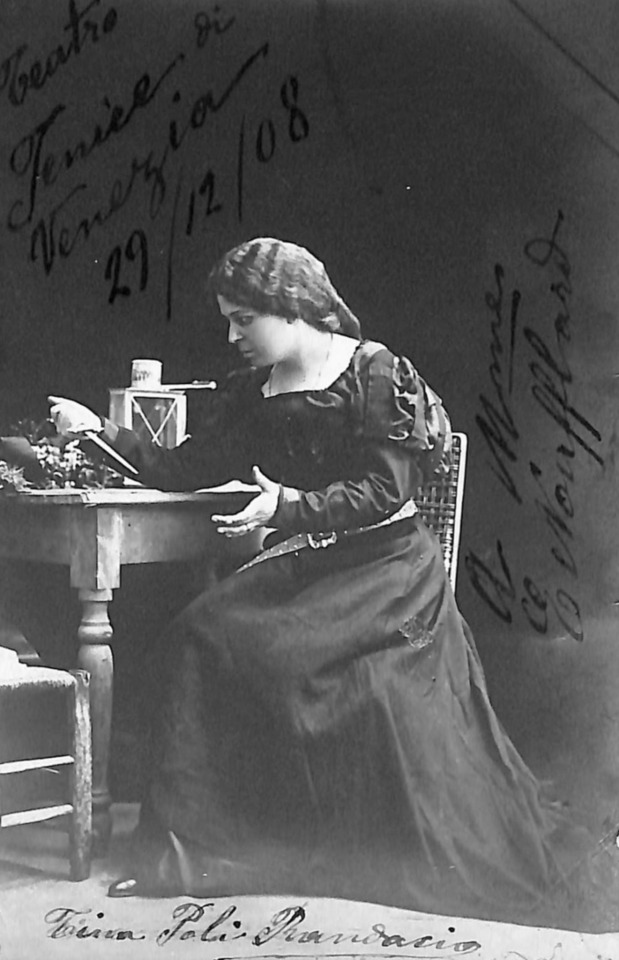
Ernestina Poli was born in Ferrara, Italy on 3 April 1879, and she studied for only a few years before making her debut at Bergamo in 1902 as Amelia in Un Ballo in Maschera. She had a huge success and was retained for another dozen performances in Il Trovatore and the then very popular Salvator Rosa. She ended the year at Massa. At this point, despite her success, she retreated from the stage for another year of training, after which she debuted at Messina in Andrea Chenier with the tenor Ruggero Randaccio. On 17 Jan, 1904 she sang Micaela for the only time in her career, again with Randaccio as her stage partner. It was not long before the couple announced that they were to be joined in life, and in the summer of 1904, shortly before a tour to South America, they were married. She immediately changed her stage name to Tina Poli Randaccio, and there are interesting and amusing confusions in some South American reviews during the tour of 1904, in which she is listed as the tenor, he the soprano. Poli was assumed to be his first name and Ruggera, hers.
The tour took the couple to Sao Paolo and Rio de Janeiro where Tina appeared as Mimi, the Trovatore Leonora, Desdemona, Aida, Maddalena di Coigny, Gioconda and Santuzza. He sang in Boheme, Andrea Chenier and Cavalleria Rusticana. The year ended at Sao Paolo with an opera called Cristo alla Festa di Purim, after which she added La Forza del Destino, Ballo in Maschera and Ernani to her assignments in Brazil. The couple traveled with the company to Manaus and Pernambuco, then returned to Europe where Ruggero announced his retirement from the stage. They decided that he would be her manager and coach, and from about this point his name was never seen on a billboard again.
On 2 December 1904 Tina debuted at Milan's Teatro Dal Verme in an opera called Jana with Bergamasco and Schiavazzi conducted by Serafin and from there she went to Oporto where she sang in Aida, Il Trovatore, Don Carlo, Pagliacci, Un Ballo in Maschera and Cavalleria Rusticana. After a short respite, the couple sailed for Mexico, and in September 1905 Tina appeared at the capitol in Les Huguenots (in Italian), Aida, Germania, Un Ballo in Maschera and Giordano's recently produced opera Siberia. The company included Virginia Guerrini, Alice Zeppilli, De Marchi and Magini Coletti, and it is not surprising, given those names, that the tour extended for four months and included visits to Guadalajara.
Turin welcomed her back to Italy when she appeared at the Teatro Vittorio Emanuele as Gioconda in January of 1907. A tour to Bucharest was arranged by Randaccio and on 11 November Tina debuted as Aida in a cast that included De Angelo, Angioletti and Bellat. On the 18th, she sang in Ernani with Angioletti, Titta Ruffo and Torres de Luna. Her season continued into the middle of December with Un Ballo in Maschera and Il Trovatore, both with Ruffo, Les Huguenots, and La Gioconda. A visit was made to Kiev and Odessa, but I have no record of her roles.
Tina debuted at Parma's Teatro Regio on 6 January 1908 in Mascagni's brand new opera, Amica and after singing in Red Roses and Damnation of Faust, she undertook a four month tour of Italy with the new work, under Mascagni's direction. The cities visited included, Firenze, Bologna, Modena, Verona, Treviso, Trieste, Ravenna, Ancona, Cesena and Forli, where she received a thunderous welcome and was hailed as the greatest soprano seen there in a generation. At Livorno she sang in the composer's Le Maschere and Iris and the tour ended at Rome's Teatro Adriano, where Tina sang eleven performances of Amica and several of Le Maschere, the latter with Juanita Caracciolo and Carlo Galeffi.
On 26 December, Tina made a much heralded debut at Venice's Teatro la Fenice as Aida with Ladislava Hotkowska and Henderson. The revival was so well received that a scheduled three performances became six. At Fiume, in April, she sang in Ernani and La Gioconda and in October she returned to the Adriano for Tosca, Aida and the world premiere of Raffaelo,by De Lunghi.
In February 1910 Tina debuted at Madrid's Teatro Real as Gioconda in a cast that included Flora Perini, Giuseppe Taccani and Ruffo, after which she sang ten performances of Aida and six of Loreley at Catania's Masimo Bellini. The spring found the Randaccios back in Brazil, where, at Rio de Janeiro, on 27 May, Tina sang Isolde for the only time in her career, though it was a moderate, if not overwhelming success. At Rio, she also sang in Il Trovatore, La Gioconda, Loreley, Tosca, Aida, and Germania, and at Sao Paolo, she added another new work, Boscaiuola. Tina's tour partners included Anna Gramegna, Krismer, Giraldoni and Viglione-Borghese, and, as had been the case in Mexico, this starry roster resulted in an extended season both in Rio and in Sao Paolo.
The most important moment of her career had arrived. On 17 December 1910 Tina debuted at La Scala as the Siegfried Brunnhilde, with the inimitable Giuseppe Borgatti in the title role. There were a dozen performances, and the production was a complete success. Fanny Anitua was an unforgettable Erda according to contemporary reviews, and the hero and heroine received memorable ovations every evening. Though hers would not be a major career in the most important of all Italian theaters, it continued at intervals for a good number of years, and included several world premiers.
In February 1911 Tina returned to Parma for La Gioconda and then took a well needed break from performing. During the summer, she learned the role of Minnie in La Fanciulla del West, and on 10 September, at Puccini's invitation, she sang the first of thirteen performances at Lucca's Teatro del Giglio with Taccani as Dick Johnson. Her success was enormous, in fact, greater than her predecessor, Eugenia Burzio, who had sung in the Italian premiere earlier in the season. Poli was immediately engaged to repeat the opera at Naples' San Carlo with Martinelli and Viglione-Borghese and at Bari's Teatro Petruzzelli with Corti and Mariano Stabile. After a debut at Palermo's Massimo as Gioconda in March 1912, she sang Minnie at Monte Carlo, again with Martinelli and Viglione-Borghese, and in late May she debuted at the Paris Opera as Minnie in a gala performance with Enrico Caruso.
In November, Tina sang in La Gioconda at Genoa and then prepared for the Scala premiere of Fanciulla. There were many sopranos who had vied for the honor, whose partisans had lobbied intensely for them, and the uncertainty had been a major story in Italian newspapers. Burzio reigned at Scala, but it was not to be. Tina's reputation as Minnie was by now so secure that both Scala's management and the composer agreed that she deserved the honor. On 29 December, before a star studded audience, the Milan theater presented La Fanciulla del West for the first time with Poli Randaccio, Martinelli and Galeffi. Tullio Serafin was on the podium, and the clamor was so enormous that the opera was repeated fourteen times.
Tina repeated Minnie at Monte Carlo in February 1913 with Martinelli and George Baklanov, after which she sang the role at the site of its Italian premiere, the Costanzi of Rome. In the spring there were concerts at Modena in honor of the centenary of Verdi's birth and on 15 December, Tina sang in the world premiere of Mascagni's Parisina at La Scala under the composer's baton. The cast included Luisa Garibaldi, Hipolito Lazaro and Galeffi, and there were twelve performances.
On 10 February 1914 Poli sang in the world premiere of Smareglia's Abisso and on 2 April in the world premiere of Alfano's Ombra di Don Giovanni, both at La Scala. In May she sang in Tosca at Milan's Teatro Carcano with Garbin and Viglione-Borghese and in October Tina participated in one of this century's most important stage debuts, that of Beniamino Gigli as Enzo, at Rovigo, on 15 October. It was the scene of veritable riots; a star had truly been born, and there were thirteen performances. Tina's year ended with Un Ballo in Maschera at Piacenza, a revival shared with the equally celebrated Celestina Boninsegna.
Rome's Costanzi welcomed Tina back as Gioconda, Tosca and Minnie in the winter of 1915, and after Gioconda at Naples and Aida at Firenze, she sailed for South America and her debut at the Teatro Colon of Buenos Aires. On 25 May, Poli debuted as Gioconda in a cast that included Perini, Lazaro, and Riccardo Stracciari. La Prensa referred to her as "a major talent whose voice can send shivers down one's spine, so present and immediate is the reaction". On 6 June she sang Santuzza and on the 17th, she sang in a concert with Caruso, Bernardo de Muro, Mario Sammarco and Lazaro. The season ended with Tosca and had included performances with the company at Cordoba and Rosario, where she sang Tosca and Santuzza, and at Tucuman, where she sang Santuzza.
Tina traveled from Argentina to Santiago, Chile, and on 27 August, she opened the season at the Teatro Municipal in La Fanciulla del West. The work was so well received that an additional performance was added; it was the only opera to be seen as many as four times. She stayed at Santiago for two months, singing Tosca, Aida, Gioconda, Santuzza, the Trovatore Leonora and Maddalena di Coigny and appeared as Aida, Tosca, Gioconda and the Trovatore Leonora at Valparaiso. Tina returned to Buenos Aires in late October where, at the Teatro Coliseo, she sang all of her Chilean roles except for Maddalena, and after a brief rest, she undertook a long tour of the Caribbean Basin. World War I was in its most intense period and the safety of the Western Hemisphere certainly seemed more attractive than the dangers of Europe.
On 29 January 1916 Tina debuted at Havana as Aida, and later sang in Tosca, Il Trovatore, Cavalleria Rusticana, Iris, La Gioconda, Les Huguenots, and La Fanciulla del West. Her tenor partners were Lazaro and Zinoviev; Enrico Roggio carried most of the baritone weight and Amelita Galli-Curci appeared with Poli in Les Huguenots (in Italian). The company stayed at the Cuban capitol for nearly two months, then toured to Cienfuegos, Camaguey, Santiago de Cuba, Mananzas and in the late spring, to Costa Rica.
In November Tina returned to Italy for Tosca at Bologna with Aureliano Pertile and Jose Segura-Tallien and in January 1917 she sang at Milan's Dal Verme in a gala concert, including act 3 of Aida and act 4 of La Gioconda. At La Spezia she sang Aida, and in June Tina debuted at Zurich as Tosca with Gubellini and Sammarco. After singing Santuzza at the Swiss theater, she returned to the Dal Verme for Aida and at Genoa, she sang in La Gioconda with Vita Ferluga, Folco-Bottaro and Galeffi.
Tina decided that the climate in Europe was not what the doctor ordered, and in fact, work was difficult to find for nearly everyone in 1917. Many of Italy's most important theaters were closed, and those that remained open presented very shortened seasons. Havana again beckoned and Tina returned in December for Aida, La Fanciulla del West, Les Huguenots, Tosca, La Gioconda, L'Africaine, La Boheme and a new opera, Doreya. Her colleagues included the tenor, Jose Palet, Edith Mason, Maria Barrientos and the basses, Nicoletti-Korman and Virgilio Lazzari. The tour again included Camaguey, Cienfuegos and Santiago. In mid March 1918, the company moved to San Juan and Ponce for a two month season in Puerto Rico. Poli sang the same roles and added Amelia in Un Ballo in Maschera. In June, at Caracas, Venezuela she sang in Aida, Tosca, Les Huguenots, La Gioconda and Cavalleria Rusticana.
The Great War was over and Tina returned to the safety of a victorious Italy for La Gioconda at Bologna, Milan's Teatro Lirico and Firenze's La Pergola. On 18 December she reappeared in glory for the first of eleven performances of Aida at La Scala. The next few months were spent at Turin with Cavalleria Rusticana and Aida. It was during the revival of Aida that Tancredi Pasero made his absolute opera debut as Il Re, substituting for an indisposed colleague. It is with some pride that the author acknowledges this event, since Pasero's debut has always been listed as at Vicenza in La Sonnambula much later in the year. And with pleasure, I also acknowledge that this information was kindly provided by Robert Tuggle of the Metropolitan Opera Archives.
After La Fanciulla del West at Trieste's Teatro Rossetti, in late November, Tina debuted as Aida at Barcelona's Liceo and in December she completed her engagement as Gioconda. In January 1920 Tina sang thirteen performances of Aida at Trieste's Teatro Verdi with the stellar cast of Giuseppina Zinetti, Miguel Fleta and Carmelo Maugeri. Rome's Costanzi welcomed Poli back with seven performances of La Gioconda and Genoa saw her as Santuzza in March. May was spent at the Fenice of Venice, where Tina sang in Suor Angelica with Elvira Casazza and in Aida. In June, she traveled to London for a debut at Covent Garden in Tosca with Fernand Ansseau and Dinh Ghilly and was very poorly received by both public and press who recoiled from her strong vibrato and melodramatic impersonations. Tina left London after one performance, never to return.
However, on 31 July she was welcomed with an enormous ovation at the Verona Arena when she sang in Aida with Zinetti and Pertile. After La Gioconda at Turin's Teatro Chiarella, Tina returned for a very long season at Barcelona, appearing in Aida, La Gioconda, Un Ballo in Maschera, Lucrezia Borgia, Cavalleria Rusticana and Ernani, as well as in act two of Tosca during a gala benefit. Her reviews were nothing short of magnificent and in Gioconda, she was heralded by several critics as the greatest that the city had ever seen or heard. The Liceo and Tina Poli Randaccio would continue their love affair over several more seasons.
In 1921, Tina appeared at Brescia and Trieste for La Gioconda, Palermo for La Gioconda and La Fanciulla del West, Rome for Aida, the Milan Arena for La Gioconda, Vicenza for La Fanciulla del West with Ismaele Voltolini and Stabile, Venice for La Gioconda and at Parma on 29 December in a stellar revival of the Ponchielli work with Giannina Arangi Lombardi as Laura, Irene Minghini Cattaneo as La Cieca, Voltolini as Enzo, Noto as Barnaba and Bruno Carmassi as Alvise.
The new year found her in revivals of La Fanciulla del West at Naples, Milan's Carcano and at Turin where she was joined by Voltolini and Apollo Granforte. The Dal Verme hosted Tina in Il Trovatore with Zinetti, John O'Sullivan and Benvenuto Franci in October, and after eleven performances of Les Huguenots at Bologna with O'Sullivan, Poli returned to Barcelona for Aida with Aurora Buades and Lazaro, Tosca with Lazaro and Les Huguenots with Cassini and Lazaro.
Tina debuted at Cairo on 27 January 1923 as Gioconda and continued her season as Minnie and Santuzza, after which she repeated all three roles at Alexandria. Santuzza was the role of her return to Milan's Teatro Lirico in May and on 11 August she appeared at Venice's Lido di San Nicola in Aida with the riveting Gabriella Besanzoni. In November, Trieste saw Poli as Gioconda and on the 22nd, she sang in a gala performance of Aida at Rome's Costanzi in honor of the King and Queen of Spain. Zinetti, De Muro and Enrico Molinari completed the stellar cast and the conductor was Mascagni. Tina's year ended at Mantua with four performances of Tosca, after which she appeared at Brescia's Teatro Grande in Loreley. Neapolitan audiences appreciated her Trovatore Leonora and Romans admired her in L'Africaine with Pasini, Giulio Crimi, Molinari and Pasero and in Tosca with Crimi and Stracciari.
In the summer Tina debuted at Vienna as Aida with Maria Gay, Giovanni Zenatello and Viglione-Borghese, a revival that had to be repeated sixteeen times before moving to Kaiserdam, Germany in September. Berlin saw her Santuzza before she returned to Barcelona in November for another daunting season. This time Tina sang in Aida, Les Huguenots, L'Africaine and a new work, Suor Beatrice. Though Tina Poli Randaccio is primarily remembered in Italy as the quintessential Italian dramatic soprano, she had by now appeared in twenty countries, and with the singular exception of England, had been rapturously received in all. There would be a twenty first.
1925 began at Naples with L'Africaine and on 30 January, Tina returned to the Costanzi for La Fanciulla del West with Crimi and Parvis. After further performances of Tosca and Aida at the San Carlo in February, she returned to Rome for Il Trovatore and Aida. The Lido di San Nicola at Venice feted Tina to a serata di gala on 1 August as the prelude to an engagement as Aida at the Fenice, after which she sang in Tosca at Rimini with Pertile and Viglione-Borghese. In October, she returned to Genoa for La Gioconda, and on Christmas Night 1925, at Bari's Teatro Piccinni, she sang Norma for the first time. Though she sang six performances, it was not a great critical success, and she decided to drop plans for several other planned engagements in the role.
Trieste's Teatro Verdi hosted Tina in Abisso and Il Trovatore at the outset of 1926, after which she sang in La Fanciulla del West at Genoa's Carlo Felice, in Aida and a Benefit Concert at Rome's Costanzi, and in Il Trovatore at Naples' San Carlo, the last with Ebe Stignani. Poli had been singing for a quarter century and it had been an enormously intense and successful twenty five years, but Father Time, as he will, began to play his inevitable role. After Naples, it was not until September that Tina again appeared on a stage, when she debuted at the Athens Arena in Aida with Franco Battaglia. And so, her year ended.
La Scala beckoned one more time, and, on 9 March 1927, Tina sang in the world premiere of Guarino's Madame de Challant with Francesco Merli and Carlo Morelli, and with these three performances she said farewell to the theater that had presented her as its first Minnie, and in four world premieres.
Naples again welcomed Tina for Il Trovatore and Aida, and she debuted at Modena's Teatro Comunale in April as Gioconda, and, a week later she unveiled the role of Turandot at the Comunale. At Milan's Carcano she sang in Isabeau and at year's end she returned to Barcelona for the last time, appearing in Aida and La Gioconda, with identical casts, Zinetti, Aroldo Lindi, Granforte and Vela.
In February of 1928 Tina sang in Turandot at the San Carlo and in February, she bade farewell to Naples as Gioconda. In April she returned to Rome, where, at the newly named Teatro Reale, she sang for the last time, when she appeared in Il Trovatore. Her last engagement of 1928 was as Isabeau at Livorno in a revival conducted by Mascagni.
In 1929, Tina sang Gioconda and Santuzza at Milan's Lirico, Turandot at Nice, which is listed in the program as the French premiere of the Puccini opera, Aida at La Spezia and Tosca at Firenze's Teatro Verdi. In 1930, her only Italian engagements were at Genoa where she sang Isabeau, Aida, and Santuzza, after which she sailed to Caracas for a season as Gioconda, Tosca, Maddalena di Coigny, Santuzza and Elena in Mefistofele. There would be no further engagements outside of Italy, and few enough in her homeland though she continued to appear for another six years.
In 1931, she sang Santuzza at Bergamo, Gioconda for Italian Radio both at Rome and Turin, Gioconda in Palermo's Teatro Garibaldi, Nedda at Isola, and Aida at Biela and at Rome's Teatro Adriano. In 1932 she sang in Gioconda at Crema and in Tosca at Milan's Teatro Puccini and at Brescia. 1933 found her again at the Puccini for Isabeau, at the Adriano for Minnie and Aida, and at Milan's Politeama for Santuzza.
In 1934 she returned to Norma, which had played so minor a role in her career, and she sang it at both Monza and the Lido of Pesaro. At Pesaro she also sang Santuzza, a role repeated at Milan's Arena. At year's end she sang Aida at Milan's Nazionale and at the Puccini she sang in La Forza del Destino, a role repeated at Foggia in early 1935. At Foggia she also sang Santuzza. The end came in early 1936, where at Asti and finally at Modena Tina Poli Randaccio sang her opera farwell as Santuzza. The career had encompassed nearly fifty roles, and had presented her on the stages of the World over fifteen hundred times, a monumental parade of memories for nearly two generations of opera goers.
After retiring from the stage, Tina abandoned musical life almost entirely, and died at Milan on 10 February 1956.
#classical music#opera#music history#bel canto#composer#classical composer#aria#classical studies#maestro#chest voice#Tina Poli Randaccio#dramatic soprano#soprano#classical musician#classical musicians#classical voice#classical history#classical#La Scala#Paris Opera#musician#musicians#history of music#historian of music#music education#music theory#diva#prima donna
2 notes
·
View notes
Text
Bicycle Thieves/ Ladri di Biciclette (1948)
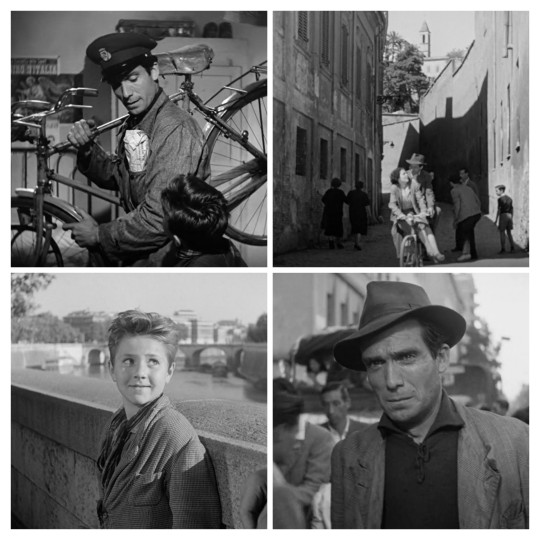
Even before you've probed into Ricci, the filmmaker makes sure you are rooting for him as soon as you hear him worrying about his pawned bicycle. You see his wise young son and the tiny baby and them having to do without bedsheets so that he can get the bicycle and start working. Future looks good for him until you remember the title of the film. Going by contemporary pace, the action is bound to go slow, but you are there with Bruno and Antonio every step of the fatiguing way as they look for the precious bicycle. Bruno's joy at the stretch of the mozzarella cheese makes you smile too and so does Maria's affectionate appraisal of Antonio when he dons his uniform the first morning of the work. I'll not dare to say that I know much about filmmaking, but what i watched was simple, real, heartfelt, and what if it is set in post-second world war Italy? You can still relate to it. You want Ricci to find the bicycle and be able to live the life he deserves to, but Italian neorealist filmmaker Vittorio de Sica will not give you the ending you wish for, because life is not like that, is it? You too find something pricking at your eyelashes when you see father and son walking away, ashamed, humiliated, despairing but still bound to live on.
#bicycle thieves#ladri de biciclette#vittoria de sica#italian neorealism#film#filmmaking#currently watching#impressions not reviews
12 notes
·
View notes
Note
I have two questions for you.
Since Johnny been gone for a while have you and the others pulled through without him?
What was it like giving Johnny a nice view of your ass and would you do it again?
ok, wise guy. For the first one, we're a good tight resourceful group, the guys and me. you ask me if we can pull through without one guy? forget about it. I mean, we really need Johnny. He's the highest ranking guy besides Tony. And Don Vittorio. And the Commission. but we can handle our own shit
for the second, I uh...no comment...
*blushes and mutters under his breath* if he likes it then yeah
5 notes
·
View notes
Text
Secret Santa | Giovanna family + la unità speciale & la squadra
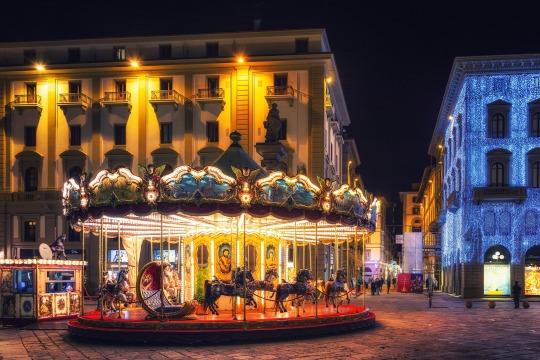
cw: pregnancy mentions. Poorly proofread.
The Giovanna household has come back to the usual two months after the twins' stand awakening —now, Christmas Eve has come.
Standing by the door, fiddling with their sweaters and grinning, the two boys exchange excited looks right as the sound of the main gate opening reaches their ears: as their father waits behind them, the little ones turn to look at him, big green eyes full of hope.
“Dad!” Jovi calls first, letting his twin finish his sentence.
“—They're back!”
Nodding, Giorno smiles, walking up to the door and right as he opens it, Akashi comes into view, Abel behind him with the others climbing off the trucks. “Come in,” he says, standing aside to reveal his sons. “How did it go?”
“Everything's okay!” hurrying inside, Akashi taps Jovi's shoulder, “Tag, you're it!” and runs off, trying to escape from the twins between giggles.
Vivianne comes next, Abel, Mista, Fugo, Paolo, Pietro, Vittorio and the rest of la squadra and unità behind her, greeting the Don and the twins through warm smiles.
“We distributed food, clothes and toys as you said, boss.” Taking a seat on the couch, Vivianne looks around, brow slightly furrowed, though she keeps her questions to herself upon the sight of Westwood, who comes in last, closing the door behind him —and trying his best to hide the bag of presents he got for everyone there, cheeks warming up.
Watching his team sitting around the living, some chatting and others playing with the twins, Giorno stands before them, right besides the fireplace. “Thank you for being here, everyone. Since you've finished your tasks, let's move on with our tradition, hm?”
Jumping before him, a box under his arm, Dante shows off the gift he (and his mom) got for secret Santa, “I want to start!”
Jumping from Akashi's lap and running up to his father and twin, Jovi picks his gift from underneath the tree, coming to a stop before his dad, “No! Me!”
Chuckling, Giorno kneels to their level, gesturing around their guests. “Boys, why don't we let uncle Paolo start? Remember this is the first time he's doing something like this.”
Turning around, two sets of big green eyes stare at Paolo, mouths hanging open and eyebrows arched —soon, the little ones walk up to the scientist, a bit shy but still confident.
“Uncle Paolo?” Dante starts, signaling at the pile of gifts underneath the massive tree in the middle of the living room. “Do you want to start?”
“Please?” Jovi adds, batting his eyelashes.
Laughing, Paolo nods as he stands up, helping them sit on his spot. “Sure boys, just give a second.”
Quietly joining her family, Lena takes a seat on the only couch left, hands resting gently on the bump, rubbing over it as soon as a foot meets her palm and her eyes lay on her husband, who comes by to sit by her side, an arm around her shoulders and a soft kiss pressed to her forehead.
“Hey,” Giorno mumbles, watching as Paolo keeps looking for the bag he so carefully picked for the occasion. “How are you feeling?”
Turning to look at him and back at the twins, she replies in a whisper. “I'm good. Took me a while to pick something because I didn't know what to wear.” a nervous laugh escapes and the twins look over, grinning as soon as they spot their mom.
Waving back at the twins and blowing them kisses, Lena turns to Giorno after a moment of not getting an answer. When she does, he's already looking at her, soft eyes and a kind smile as he takes on the soft pink blush that spreads through her cheeks. “It's okay,” he says, thumb rubbing over her shoulder, “I know you're struggling with the cold.”
“A bit, yeah.”
Looking around once more, and noticing Paolo hasn't found his present yet, Giorno stands up, taking off his jacket and laying it over her shoulders —next, and right as Paolo cheers and shows off the Christmas gift bag, he sits back, grinning as soon as he feels his wife's lips kissing his cheeks.
“Okay,” Paolo stands in the middle of the living room, looking around those reunited there, a shit eating grin spreading through his features and showing off his two rounds of sharp teeth. “Is the Kato cosplayer in the room with us now?”
Groaning, Westwood stands up, clutching his own gift under his arm. “Paolo, I said Kato is my favorite character but it's not that deep!”
“Yeah, yeah,” Paolo chuckles, amused. “But you kinda dress like him.” coming back to his seat, Westwood's left in the middle of the room now.
Sighing and trying to keep himself from bursting out laughing, Westwood takes off his mask, leaving it in the coffee table. “Okay, pink haired four thousand years old grandpa, come here.”
Wheezing, Akashi stands up, tackling Westwood into a hug.
Overlooking the sight, and with the twins' laughter over the music, Lena and Gio share soft smiles, leaning towards each other, listening to Abel, who's now the one standing in the middle, holding a big gift box in his hands. “Mini boss two: Jovi!”
3 notes
·
View notes

